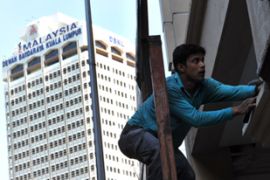Malaysia accused over migrant abuse
Amnesty report says millions of workers face conditions akin to “bonded labour”.

“There is no effective system either of workplace inspection… nor is there any effective redress for workers who want to bring individual complaints.”
Malaysian firms depend heavily on foreign labourers, with migrants making up more than a fifth of the country’s work force.
Around two million labourers are thought to work legally in the country with another one million working illegally.
Exploitation
Many are employed in construction sites, factories, restaurants, households and palm oil plantations, doing work that Malaysians will not do.
But according to Amnesty large numbers of migrants find when they arrive that they are given lower-than-promised wages and forced to work in unsafe conditions.
 |
| Many Malaysian firms depend on a large supply of migrant labour [AFP] |
It said arbitrary arrests and extortion were other common complaints.
“Migrant workers come to Malaysia to escape poverty and to provide for their families. Once they arrive, however, many workers toil in conditions that amount to labour exploitation,” the London-based rights group said in its report.
Amnesty said it had interviewed more than 200 migrant workers, both legal and illegal, for the report.
Amnesty’s Michael Bochenek, one of the report’s authors, told Al Jazeera he was surprised by the extent of the abuse while researching for the report.
“The workers we interviewed were consistently telling us about problems that are labour exploitation, forced labour, trafficking of persons that happen on such a widespread, systematic basis,” he said.
“To see both the dependence on migrant labour, comprising some 20-30 per cent of all workers in the country, on one hand, and the systematic exploitation by private employers and agents on the other hand was really startling.”
Bochenek said the situation was made worse by the lack of sound laws and the lack of implementation and enforcement of those laws, that allowed the abuses to continue.
Responsibility
Amnesty called on Malaysia’s government to amend laws to guarantee better conditions and to stop employers or recruitment agents from holding workers’ passports, restricting their ability to move about.
“The government of Malaysia has a responsibility to prevent… abuses, which can include exploitation, forced labour, and trafficking in persons,” the report said.
“Too often, the state fails to do so.”
It added: “Much of Malaysia’s approach to migration is effectively to criminalise it, even though the country could not function without migrant labour.”
Malaysia’s government has dismissed the report, saying foreign workers have the same rights as locals.
“The system of bringing in foreign workers is a well established legal system… It is fair to everybody,” S. Subramaniam, Malaysia’s human resources minister, told The Associated Press.
“We offer the same kind of protection to foreigners (as to locals)… We don’t protect employers who exploit workers.”